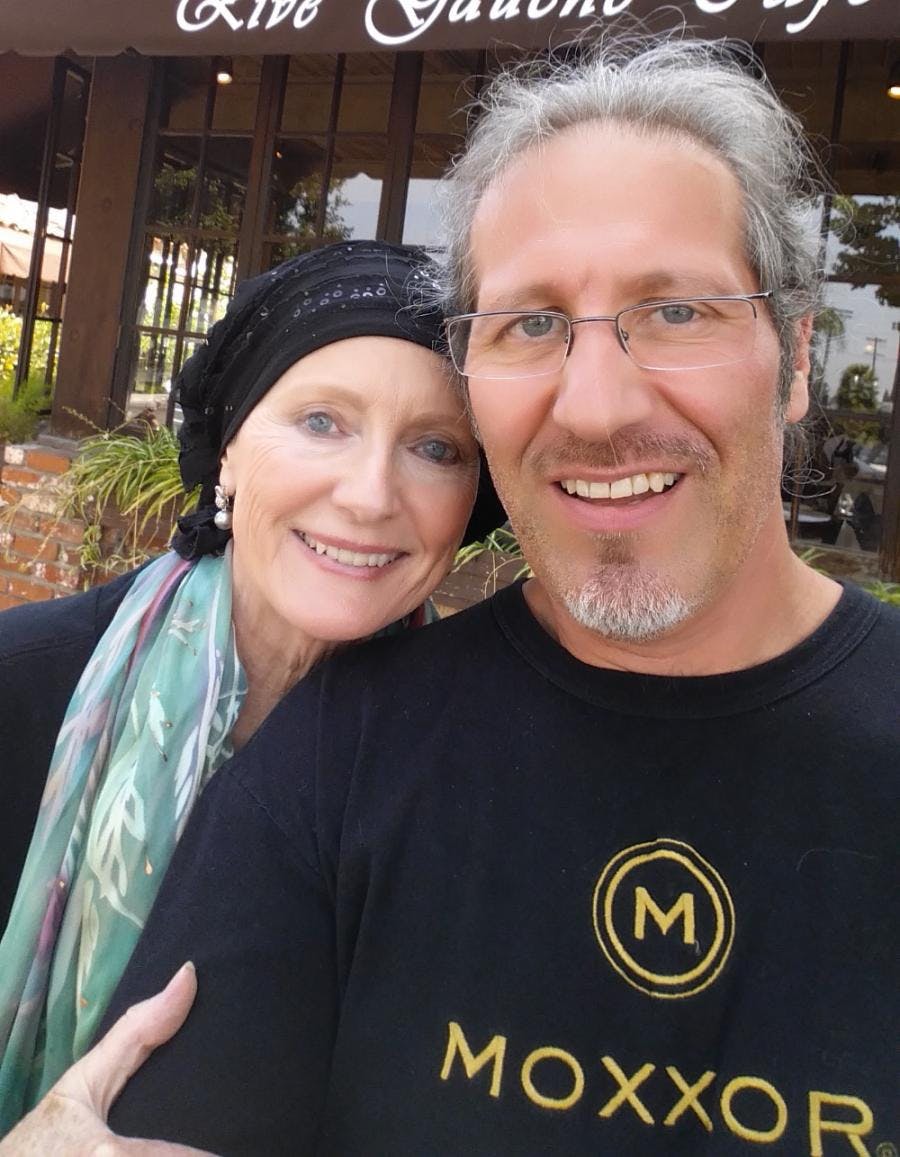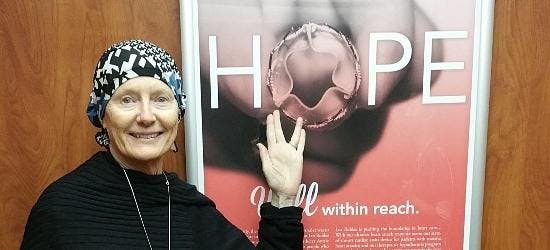Published Jun 24, 2015
Celeste Yarnall's Cancer Battle Update
Celeste Yarnall's Cancer Battle Update

Back in February, Celeste Yarnall -- one of Star Trek: The Original Series' most memorable and beautiful guest stars; she played Martha Landon in "The Apple" -- shared with StarTrek.com readers a harrowing yet hopeful account of the greatest battle of her life, a diagnosis of a deadly ovarian cancer, specifically primary peritoneal cancer. Today, Yarnall -- who's also a convention favorite and a longtime proponent of holistic medicine -- reports that, "I cautiously own the word remission and for right now that is just fine with me." And below, she returns to StarTrek.com with another harrowing yet hopeful account of what she's endured to date and the challenges still ahead.

vastating this form of cancer actually is. Before my 8-hour surgery, my doctor made a preliminary diagnosis of primary peritoneal cancer, but when the pathology report came back he could see the origin was a small tumor on each of my ovaries and then it invaded my peritoneum. See my story at http://www.gofundme.com/kvo9xs.
“Primary peritoneal cancer (PPC) is a relatively rare cancer that develops most commonly in women. PPC is a close relative of epithelial ovarian cancer, which is the most common type of malignancy that affects the ovaries. Peritoneal cancer starts in the peritoneum, and hence is called primary ... Therefore, peritoneal cancer and a type of ovarian cancer cause similar symptoms,” according to WebMD see http://www.webmd.com/…/peritoneal-cancer-prognosis-symptoms… And mine started in the ovaries. The following information comes from this WebMD site:The Link Between Peritoneal and Ovarian CancersPeritoneal cancer acts and looks like ovarian cancer. This is mainly because the surface of the ovaries is made of epithelial cells, as is the peritoneum. Therefore, peritoneal cancer and a type of ovarian cancer cause similar symptoms. Doctors also treat them in much the same way.Despite its similarities with ovarian cancer, you can have peritoneal cancer even if your ovaries have been removed. Peritoneal cancer can occur anywhere in the abdominal space. It affects the surface of organs contained inside the peritoneum.The causes of peritoneal cancer are unknown. However, there are different theories about how it begins. Some believe it comes from ovarian tissue implants left in the abdomen during fetal development. Others think the peritoneum undergoes changes that make it more like the ovaries.


Risks of Peritoneal CancerPrimary peritoneal cancer is more common in women than in men. Women at risk for ovarian cancer are also at increased risk for peritoneal cancer. This is even more likely if you have the BRCA1 and BRCA2 genetic mutations. Older age is another risk factor for peritoneal cancer.Peritoneal Cancer SymptomsJust as with ovarian cancer, peritoneal cancer can be hard to detect in the early stages. That's because its symptoms are vague and hard to pinpoint. When clear symptoms do occur, the disease has often progressed. Then, symptoms resemble those of ovarian cancer. Many of these symptoms are due to buildup of fluid (ascites) in the abdomen. Peritoneal cancer symptoms may include:Abdominal discomfort or pain from gas, indigestion, pressure, swelling, bloating, or crampsFeeling of fullness, even after a light mealNausea or diarrheaConstipationFrequent urinationLoss of appetiteUnexplained weight gain or lossAbnormal vaginal bleedingRectal bleedingShortness of breathDiagnosing Peritoneal CancerIn addition to asking about symptoms, your doctor will review your medical history and conduct a physical exam, which involves examining for abnormalities in these areas:UterusVaginaOvariesFallopian tubesStomachBladderColon and rectumTests you may have include:Ultrasound. High-frequency sound waves produce a picture called a sonogram.Peritoneal Cancer TreatmentsYou may have more than one type of treatment for peritoneal cancer. The type of treatment you have depends upon:The stage and grade of the cancerThe size and location of the cancerYour age and overall healthTreatments for peritoneal cancer include:Surgery. Surgery not only helps with diagnosis. It may also remove any tumors. To stage and treat this cancer, a surgeon removes all visible disease. The surgeon may also remove the ovaries, fallopian tubes, and uterus as well. Depending upon what is found, the surgeon may also remove other tissue and organs. It is very important to have this surgery performed by a gynecologic oncologist. These specialists are familiar with gynecologic cancers and have greater success rates.This is the surgery that I had done which lasted 8 hours.Peritoneal Cancer Prognosis: What to Expect according to WebMD:Primary peritoneal cancer prognosis is best if all cancer is removed and a gynecologic surgeon and oncologist treat you. These doctors have special knowledge of gynecologic cancers.
Your doctors will closely watch you after treatment. Peritoneal cancer can spread quickly because the peritoneum is rich in lymph and blood through which it can travel. Recurrence after treatment is common with peritoneal cancer. That's because this cancer is often diagnosed in an advanced stage. You may need more than one round of chemotherapy or other surgeries.
Be sure to seek support for yourself as you go through treatment and healing.


We all know that just the word cancer itself is so traumatic, but I think I approached the diagnosis, the surgery and the chemo pretty bravely. I recently read an excerpt from a book called “Memoir of a Debulked Woman: Enduring Ovarian Cancer,” by Susan Gubar. Debulking is a term that is referred to in this type of cancer, where the tumors are scraped off whereever they are found to the best of the surgeons ability. Gubar, shares with her readers that, “There are many forms of cancer that offer a lot of hope but not this one.” And further she quotes the frightening odds that there were 21,550 new cases of ovarian cancer in the US in the 2009 and an additional 14,600 women died from it [in the UK, 6,500 women are diagnosed with the disease every year, and 4,400 die every year]. It used to be estimated that one out of 70 American women would get the disease, the deadliest of all gynaecological cancers, though recently the number sometimes cited is one in 55. There are very few published personal accounts for them to consult, since for decades, indeed for centuries, women have generally maintained silence about the silent killer.”I hope to beat these devastating odds and even write about how I did it -- but I still I need your help to survive in order to do so. My alternative therapies are very costly and not covered by my insurance -- as are so many things that we get bills for, even from the mainstream medical treatments. I need these alternative protocols because the traditional treatments such as chemo don’t offer much hope. The best hope comes from a good surgery outcome in the first place. When we research cancer we find that the traditional protocols such as chemo (I have now completed six rounds) seem to accelerate the chances of the cancer returning, even though the initial response to these toxic drugs seems encouraging.In fact Gubar quotes from "A Gynecologist’s Second Opinion," published in 2003, opening a chapter on the disease with a sinister warning: “If 'cancer' is one of the most dreaded words in the English language, then for most women, 'ovarian' is the worst adjective to place before it. In all the bad news we sometimes deal with in gynaecology, this is the most frightening.”Well, I am trying very hard to not be frightened and not accept this death sentence and to continue to battle against it. I hope my story helps you cope with what you might be dealing with in this life, but please don’t forget me. I want so much to share a successful outcome in hopes it will help others, but as I said, I so need your help.Let me say that I truly appreciate what you have all done thus far and I thank you from the bottom of my heart. Please remember that even the $5 donations are just as appreciated as the larger ones as every penny helps me stay the course... a course that I hope will let me say to you that I have won the battle. And perhaps the way I do it will also help others, too.If the spirit moves you please give what you can and don’t forget to share this with others, as I have listed the symptoms of ovarian cancer here in an effort to help other women. As Gubar writes, "Women need to heed the muted or misunderstood symptoms of ovarian cancer, and to agitate for early detection tools. We must save our successors from an undetectable and then unfixable condition that continues to threaten the health and welfare of future generations.”http://www.gofundme.com/kvo9xsMuch love to you, dear friends -- and I hope to be well enough to honor my commitment to attend the official Star Trek convention in Las Vegas in August.
Xoxo,Celeste Yarnall
